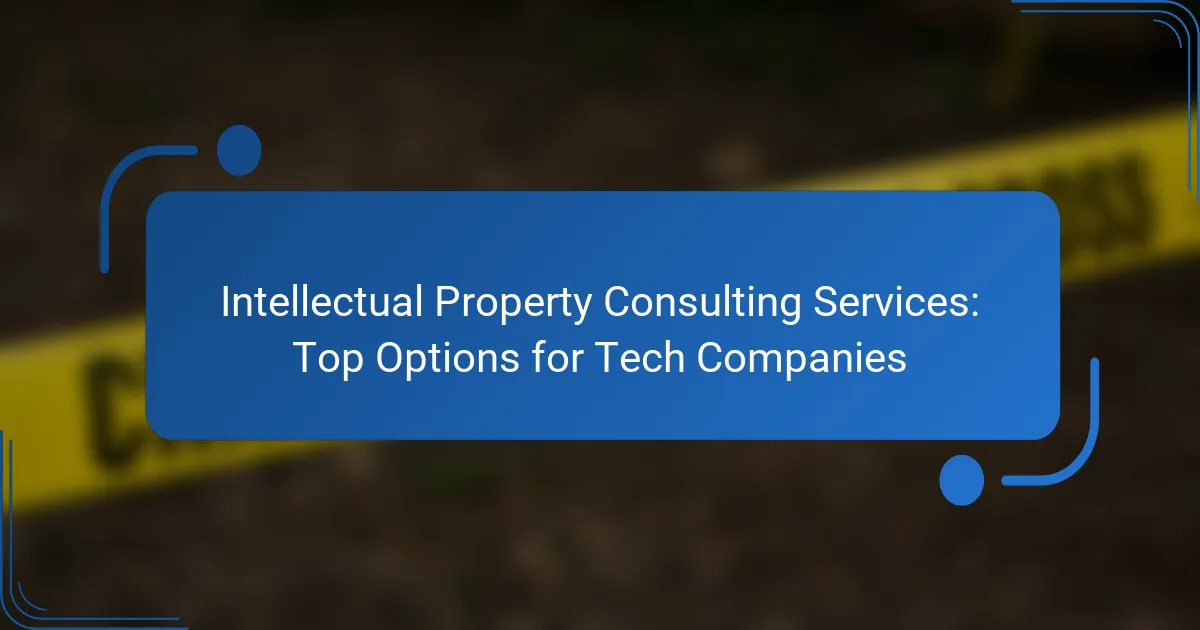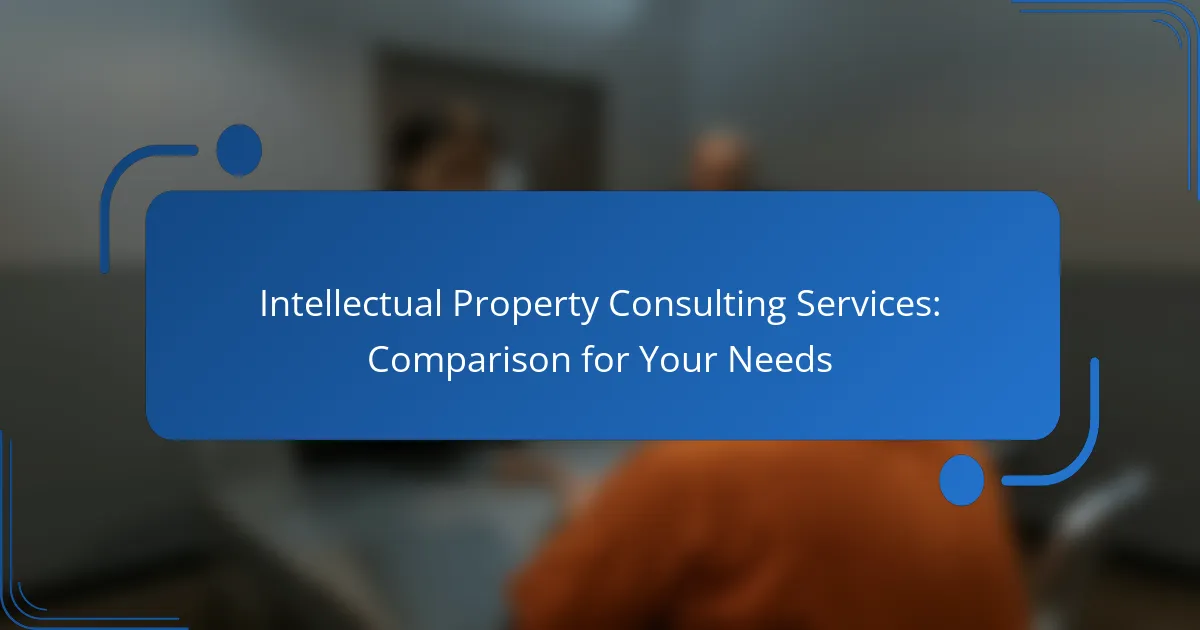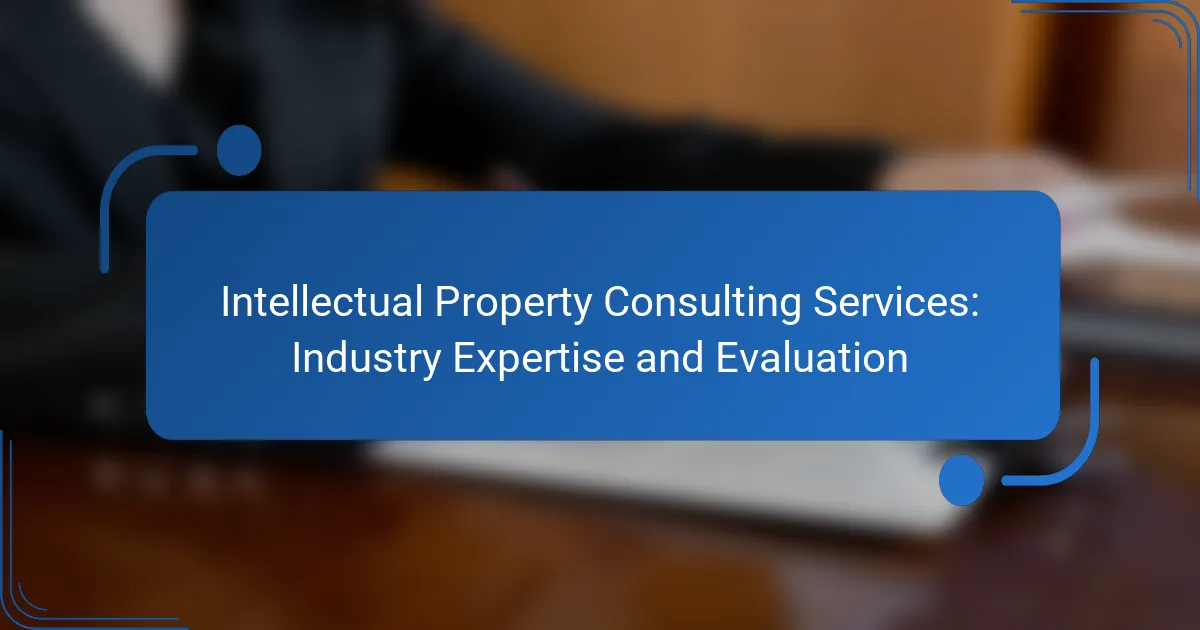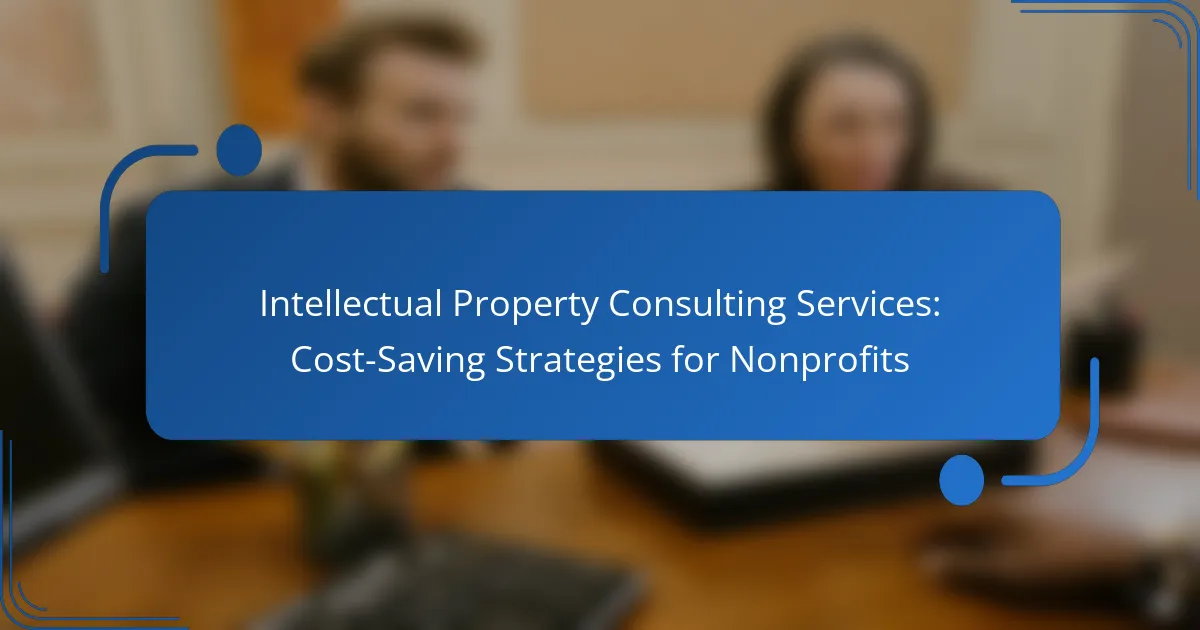For tech companies, selecting the right intellectual property consulting services is crucial for protecting innovations and navigating the complexities of IP law. These services offer tailored support in managing patents, trademarks, copyrights, and trade secrets, helping businesses enhance their market presence while minimizing legal risks. By prioritizing expertise and client feedback, companies can find a consultant that aligns with their specific needs and objectives.
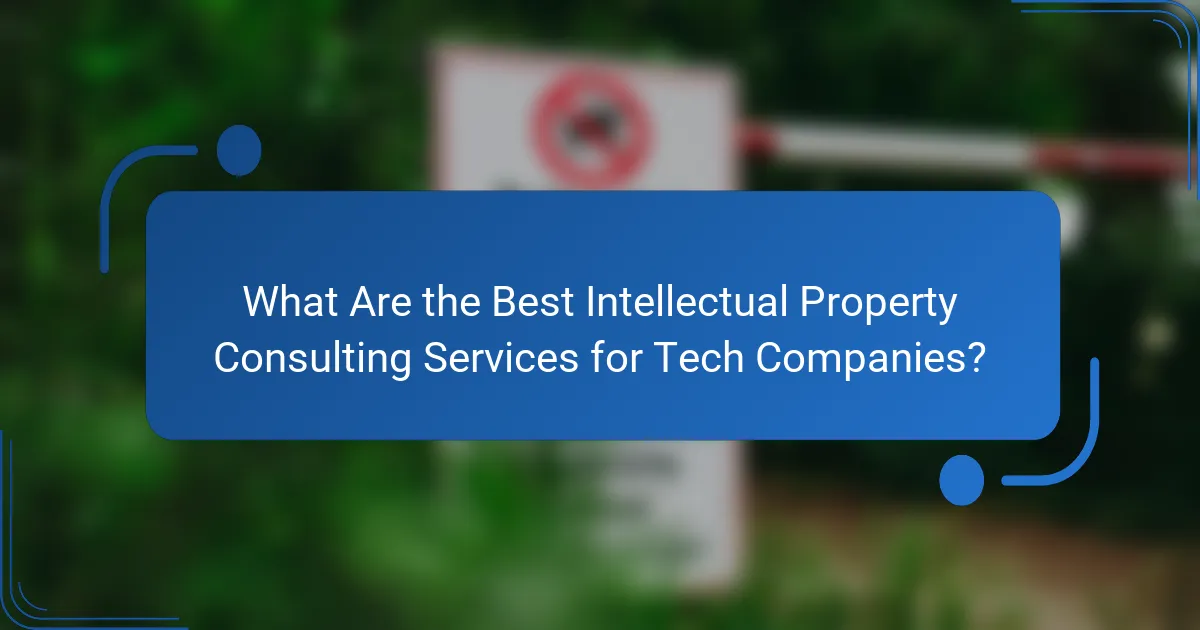
What Are the Best Intellectual Property Consulting Services for Tech Companies?
The best intellectual property consulting services for tech companies provide tailored support in managing patents, trademarks, copyrights, and trade secrets. These services help businesses protect their innovations and navigate the complexities of intellectual property law effectively.
LegalZoom
LegalZoom offers a user-friendly platform for tech companies seeking intellectual property protection. Their services include trademark registration, patent filing, and copyright protection, making it a comprehensive choice for startups and established firms alike.
With transparent pricing and a straightforward application process, LegalZoom is ideal for companies looking to secure their intellectual assets without extensive legal fees. However, it may lack the personalized service that larger firms provide.
UpCounsel
UpCounsel connects tech companies with experienced attorneys specializing in intellectual property law. This platform allows businesses to find legal experts who can provide tailored advice and services, including patent applications and trademark registrations.
One advantage of UpCounsel is the flexibility in choosing legal professionals based on specific needs and budget. Companies should consider the varying rates of attorneys, which can range from moderate to high, depending on expertise.
IPWatchdog
IPWatchdog is a valuable resource for tech companies seeking insights into intellectual property issues. They offer consulting services alongside a wealth of articles and resources that cover the latest trends and legal developments in IP law.
While IPWatchdog is not a traditional consulting firm, its educational content can help companies make informed decisions about their intellectual property strategies. Businesses should leverage this knowledge to stay ahead in a competitive market.
Rocket Lawyer
Rocket Lawyer provides affordable legal services, including intellectual property consultations, for tech companies. Their platform allows users to create legal documents and access attorney advice on various IP matters.
This service is particularly beneficial for startups looking for cost-effective solutions. However, companies may find that the level of personalized service is less than what traditional law firms offer.
Trademarkia
Trademarkia specializes in trademark registration and monitoring, making it an excellent choice for tech companies focused on brand protection. Their platform simplifies the trademark application process and offers tools for searching existing trademarks.
With competitive pricing and a user-friendly interface, Trademarkia is suitable for businesses of all sizes. Companies should ensure they understand the trademark registration process to avoid common pitfalls, such as filing for similar marks that could lead to disputes.
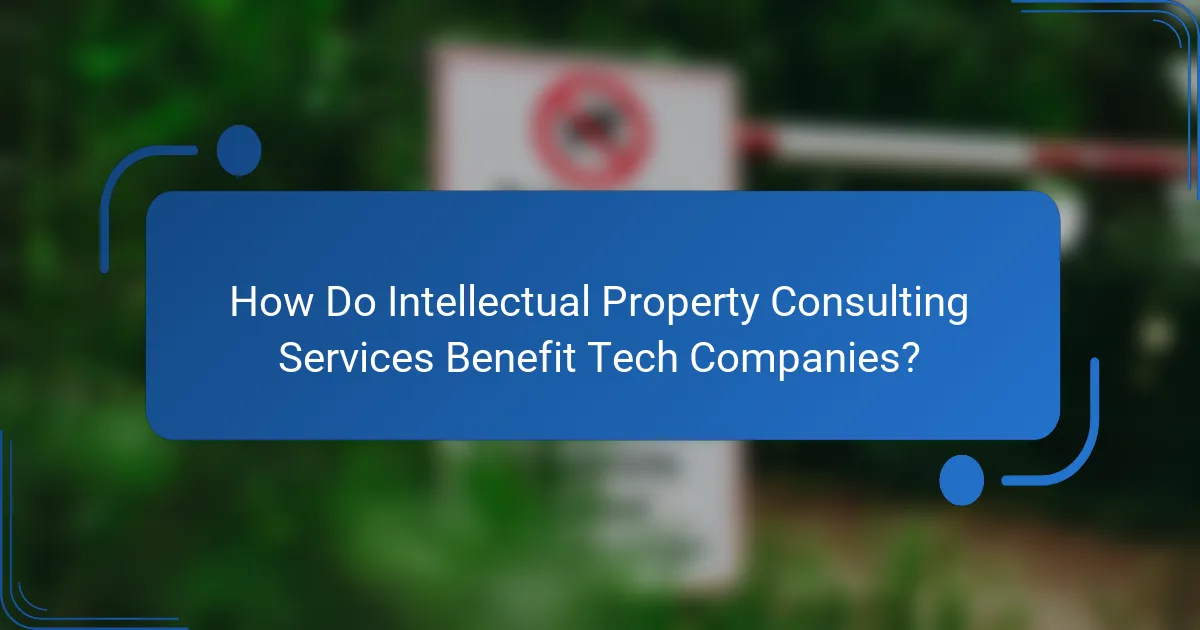
How Do Intellectual Property Consulting Services Benefit Tech Companies?
Intellectual property consulting services provide tech companies with essential strategies to safeguard their innovations, enhance their market presence, and minimize legal risks. By leveraging expert guidance, these companies can navigate complex IP landscapes effectively.
Protection of Innovations
Protecting innovations is crucial for tech companies, as it ensures that their unique ideas and products remain exclusive. Intellectual property consulting services help in identifying the right type of protection, such as patents, trademarks, or copyrights, tailored to the specific innovations.
For instance, a software company may seek patent protection for a novel algorithm, while a hardware manufacturer might focus on trademarking its brand. Consulting services can also assist in conducting thorough prior art searches to avoid potential infringement issues.
Market Positioning
Effective market positioning is vital for tech companies to differentiate themselves from competitors. Intellectual property consulting can provide insights into how to leverage IP assets for branding and marketing strategies, enhancing visibility and consumer trust.
For example, a tech startup may use its patented technology as a selling point in marketing campaigns, showcasing its uniqueness. Additionally, consulting services can guide companies in developing licensing strategies that can open new revenue streams while maintaining brand integrity.
Risk Mitigation
Risk mitigation is a key benefit of intellectual property consulting services, as they help tech companies identify and manage potential legal challenges. By conducting IP audits and assessments, consultants can pinpoint vulnerabilities and recommend proactive measures.
For instance, a company may discover that its product infringes on an existing patent, allowing it to pivot before facing costly litigation. Consulting services can also provide guidance on compliance with local regulations, such as the European Union’s General Data Protection Regulation (GDPR), ensuring that companies operate within legal frameworks.
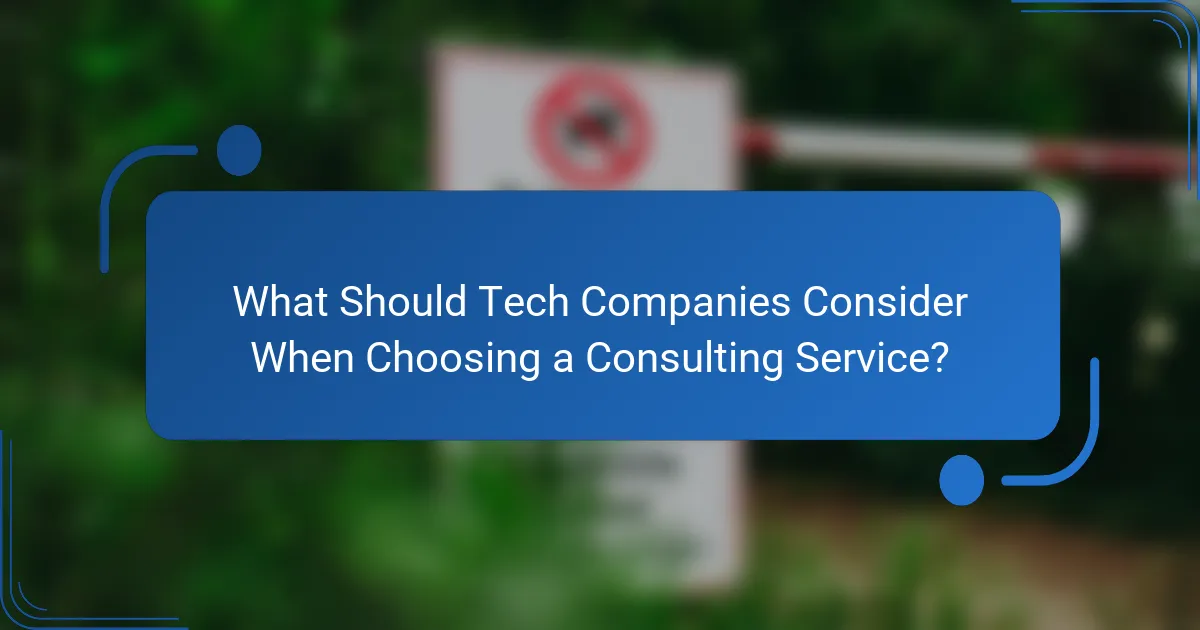
What Should Tech Companies Consider When Choosing a Consulting Service?
Tech companies should prioritize expertise, service offerings, and client feedback when selecting an intellectual property consulting service. Understanding these factors can help ensure that the chosen consultant aligns with the company’s specific needs and objectives.
Experience in Technology Sector
When evaluating consulting services, consider their experience specifically within the technology sector. Firms with a strong background in tech are more likely to understand the unique challenges and innovations that tech companies face.
Look for consultants who have worked with similar businesses or have a portfolio showcasing successful projects in technology. This experience can translate into more effective strategies and solutions tailored to your needs.
Range of Services Offered
Assess the range of services provided by the consulting firm. A comprehensive service offering may include patent strategy, trademark registration, licensing agreements, and litigation support. This breadth can be beneficial for tech companies that require multiple aspects of intellectual property management.
Choosing a firm that offers a full suite of services can save time and resources, as you won’t need to engage multiple consultants for different needs. Ensure that the firm can adapt its services to your specific technology and market requirements.
Client Testimonials
Client testimonials and case studies can provide valuable insights into a consulting firm’s effectiveness. Look for feedback from companies in similar industries or with comparable challenges to gauge how the consultant has performed in real-world scenarios.
Positive testimonials can indicate a firm’s reliability and ability to deliver results. Consider reaching out to previous clients for direct feedback, which can help you make a more informed decision.
Pricing Structure
Understanding the pricing structure is crucial when selecting a consulting service. Different firms may offer varying pricing models, such as hourly rates, project-based fees, or retainer agreements. Evaluate which model aligns best with your budget and project scope.
Be wary of hidden costs that may arise during the consulting process. Request a detailed breakdown of fees and potential additional charges to avoid surprises later on. Comparing pricing across several firms can also help you identify a competitive rate for the services you need.
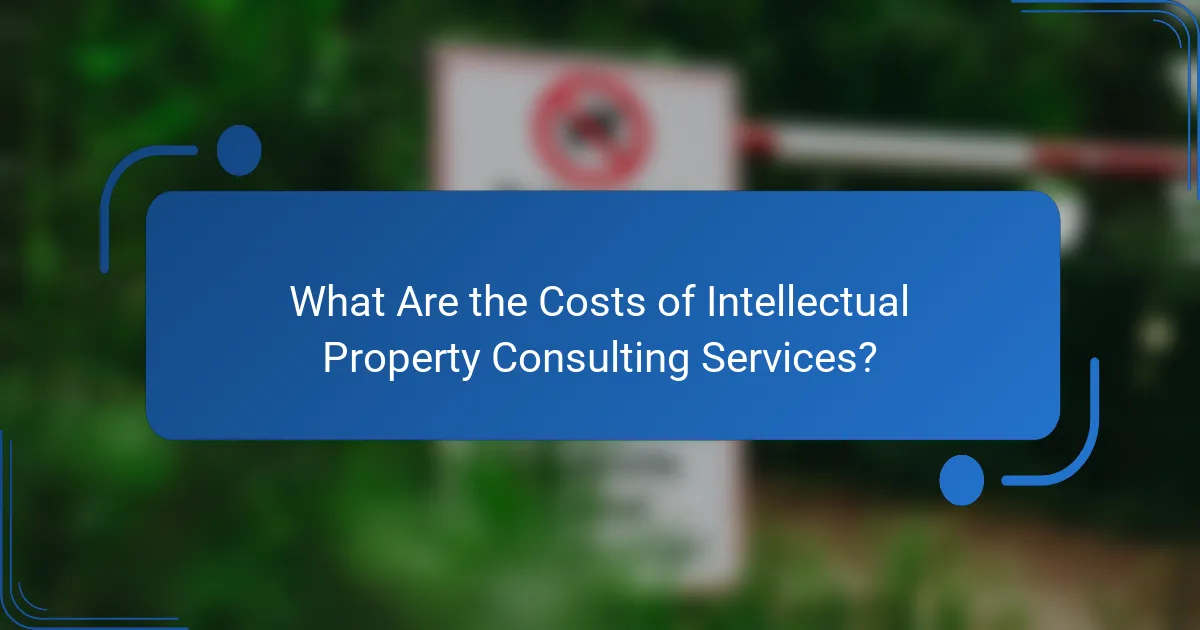
What Are the Costs of Intellectual Property Consulting Services?
The costs of intellectual property consulting services can vary significantly based on factors such as the complexity of the project, the consultant’s expertise, and the pricing model used. Understanding the different pricing structures—hourly rates, flat fees, and retainer agreements—can help tech companies budget effectively for these essential services.
Hourly Rates
Hourly rates for intellectual property consultants typically range from low hundreds to over a thousand dollars per hour, depending on the consultant’s experience and the project’s complexity. This model is beneficial for companies that need specific, short-term advice or assistance with particular tasks.
When considering hourly rates, it’s crucial to clarify what services are included and whether there are any additional costs for materials or travel. Always request an estimate of the total hours expected to avoid unexpected expenses.
Flat Fees
Flat fees are a fixed cost for specific services, such as filing a patent or conducting a trademark search. This pricing model provides predictability in budgeting, as companies know the total cost upfront.
Flat fees can vary widely based on the service provided. For example, a trademark registration might cost a few hundred to a couple of thousand dollars, while a comprehensive patent application could range from several thousand to tens of thousands of dollars. Ensure the scope of work is clearly defined to avoid scope creep.
Retainer Agreements
Retainer agreements involve paying a consultant a set fee to secure their services over a specified period. This model is ideal for tech companies that require ongoing support and advice on intellectual property matters.
Retainers can range from a few thousand to tens of thousands of dollars per month, depending on the level of service and the consultant’s expertise. Companies should assess their needs and negotiate terms that ensure they receive adequate support without overcommitting financially.
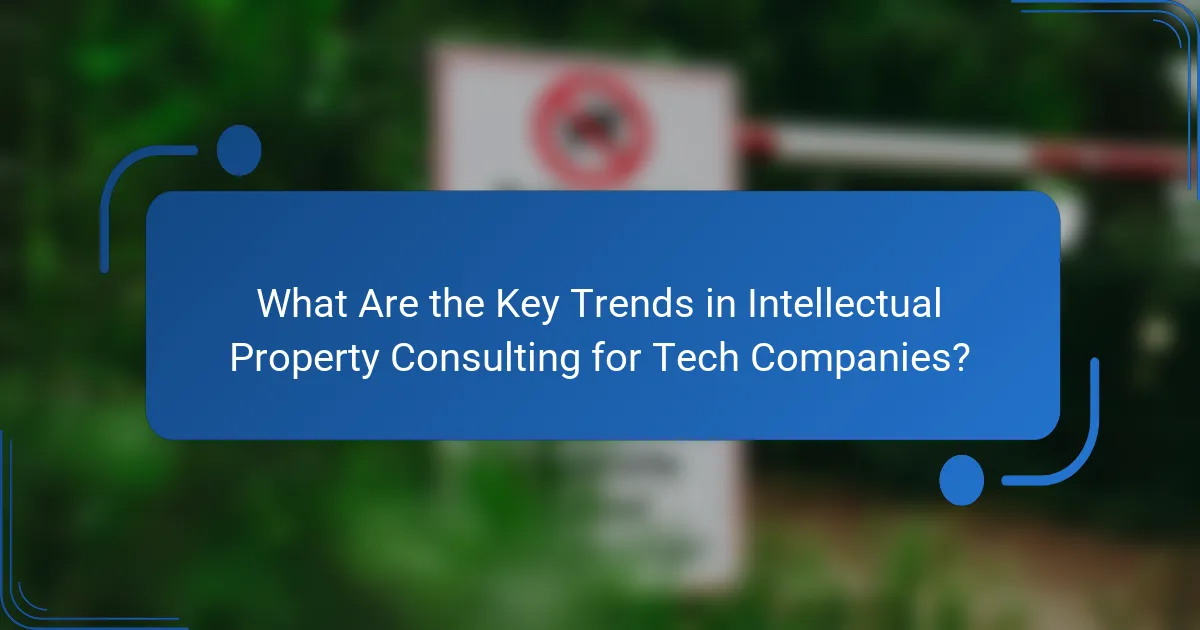
What Are the Key Trends in Intellectual Property Consulting for Tech Companies?
Tech companies are increasingly focusing on intellectual property (IP) consulting to navigate complex regulations and protect their innovations. Key trends include a heightened emphasis on AI and software patents, the rise of remote consulting services, and the integration of advanced technology in IP management processes.
Increased Focus on AI and Software Patents
The surge in artificial intelligence and software development has led to a growing demand for specialized IP consulting services. Companies are seeking to secure patents that protect their unique algorithms and software solutions, which can be challenging due to the evolving nature of technology and patent laws.
Consultants advise tech firms on the intricacies of patent eligibility, especially in areas where traditional patent frameworks may not apply. They help identify potential patentable innovations and guide clients through the application process, ensuring compliance with relevant regulations.
Remote Consulting Services
The shift towards remote work has transformed how IP consulting services are delivered. Many firms now offer virtual consultations, allowing tech companies to access expertise without geographical limitations. This trend has made it easier for startups and smaller companies to obtain high-quality consulting at a lower cost.
When engaging remote consultants, companies should ensure that their chosen providers have robust communication tools and a clear understanding of their specific IP needs. This approach can enhance collaboration and streamline the consulting process.
Integration of Technology in IP Management
Tech companies are increasingly adopting digital tools to manage their intellectual property portfolios effectively. Software solutions that automate patent tracking, trademark management, and compliance monitoring are becoming essential for maintaining competitive advantage.
Utilizing technology in IP management can lead to significant efficiencies, reducing the time spent on administrative tasks. Companies should evaluate various IP management software options to find solutions that align with their operational needs and budget constraints.
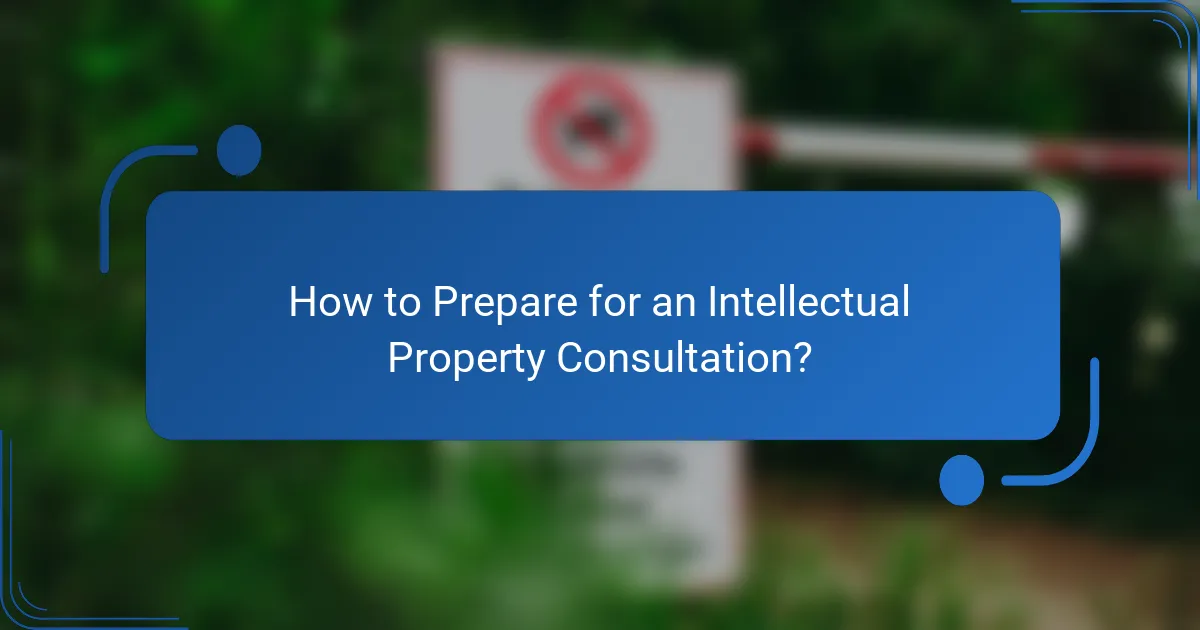
How to Prepare for an Intellectual Property Consultation?
Preparing for an intellectual property consultation involves gathering relevant information and understanding your specific needs. This ensures that the consultation is productive and tailored to your tech company’s unique situation.
Gather Relevant Documentation
Collect all pertinent documents related to your intellectual property, including patents, trademarks, copyrights, and any existing agreements. This documentation provides a comprehensive overview of your current IP landscape and helps the consultant identify potential issues or opportunities.
Consider organizing your materials chronologically or by type to streamline the consultation process. Having everything in one place can save time and facilitate a more focused discussion.
Define Your Goals
Clearly outline what you hope to achieve from the consultation. Whether you are seeking to protect new innovations, resolve disputes, or explore licensing options, having defined goals will guide the conversation and ensure that your priorities are addressed.
For example, if your objective is to secure a patent for a new software application, communicate this upfront so the consultant can provide targeted advice and strategies.
Research Potential Consultants
Investigate various intellectual property consultants and their areas of expertise. Look for professionals with experience in the tech industry and a proven track record of success in handling cases similar to yours.
Consider reading reviews, checking credentials, and asking for referrals from other tech companies. A well-matched consultant can significantly enhance the effectiveness of your consultation.
Prepare Questions
Formulate a list of questions to ask during the consultation. This can include inquiries about the consultant’s experience, the IP protection process, and potential costs involved. Having prepared questions ensures that you cover all necessary topics and make the most of your time.
Examples of questions might include: “What are the typical timelines for patent applications?” or “How can we best protect our software innovations?”
